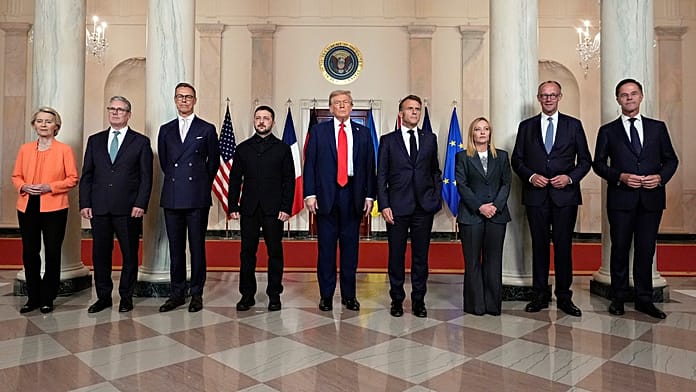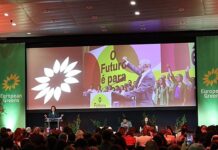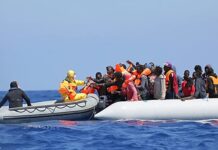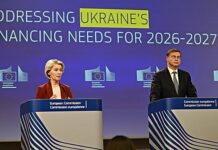
By Euronews
Published on
•Updated
European leaders have backed the proposal by US President Donald Trump on Tuesday to establish a ceasefire in Ukraine along the current line of fighting.
Unlike the Europeans, Trump’s plan hinges on ending the war at the current contact line, while the European leaders see it as a starting point for further negotiations.
Trump pitched the plan last week after speaking with his Russian counterpart Vladimir Putin by phone and meeting Ukrainian President Volodymyr Zelenskyy at the White House.
After his meeting with Zelenskyy last Friday, Trump said “it is time to stop the killing, and make a deal” in a post on his platform Truth Social.
“They should stop where they are. Let both claim victory,” he added.
“We strongly support President Trump’s position that the fighting should stop immediately, and that the current line of contact should be the starting point of negotiations,” 10 top European leaders and Zelenskyy said in a joint statement on Tuesday.
“We remain committed to the principle that international borders must not be changed by force,” they added.
The leaders accuse Russia of dragging its feet by refusing to accept the immediate and unconditional ceasefire in Ukraine, a proposal that Trump himself embraced until he met with Putin in Alaska, when he shifted to calling for a full-fledged peace deal.
Going straight to an agreement without a ceasefire first is the Kremlin’s desired strategy, as it allows the country to continue its relentless bombing campaign on Ukraine, possibly capture more territory and weaken Kyiv’s hand at the negotiating table.
Over the weekend, Trump appeared to revert to his original ceasefire proposal when he said the warring parties should “stop at the lines where they are, the battle lines”.
“Go home, stop killing people and be done,” Trump said on Air Force One.
Trump denied having asked Zelenskyy to give up the Donbas, the eastern region of Ukraine that Russia, despite partially occupying, wants to claim in its entirety. Zelenskyy has said Ukraine’s constitution prohibits any cessation of territory.
“Russia’s stalling tactics have shown time and time again that Ukraine is the only party serious about peace. We can all see that Putin continues to choose violence and destruction,” the European leaders said.
“Therefore, we are clear that Ukraine must be in the strongest possible position – before, during, and after any ceasefire. We must ramp up the pressure on Russia’s economy and its defence industry until Putin is ready to make peace.”
The statement was signed by European Commission President Ursula von der Leyen, European Council President António Costa, French President Emmanuel Macron, UK Prime Minister Keir Starmer, German Chancellor Friedrich Merz, Italian Prime Minister Giorgia Meloni, Polish Prime Minister Donald Tusk, Norwegian Prime Minister Jonas Gahr Støre, Danish Prime Minister Mette Frederiksen, Finnish Prime Minister Alexander Stubb and the Ukrainian president.
The statement comes as Europeans grapple with Washington’s ever-shifting diplomacy and the prospect of a Trump-Putin summit hosted by Hungary, a country that has repeatedly sought to block collective support for Ukraine.
Trump’s announcement last week that he was willing to meet Putin in Budapest would mark the first time the Russian leader, who is under EU sanctions and an arrest warrant by the International Criminal Court, sets foot on European soil since the start of the full-scale invasion.
Overnight, US media outlets reported the anticipated summit might be delayed, or not happen at all, after Americans sensed Moscow’s position remains uncompromising.
Russia’s all-out war on Ukraine is set to top the agenda of an EU summit on Thursday, which Zelenskyy is expected to attend in person. The following day, Starmer will host his allies for a meeting of the “Coalition of the Willing” in London.
Brussels is currently working on a new package of EU sanctions against Russia, which remains blocked by Slovakia, and on a groundbreaking initiative to use Russia’s frozen assets to issue a €140 billion loan to Ukraine as long-term assistance.

















